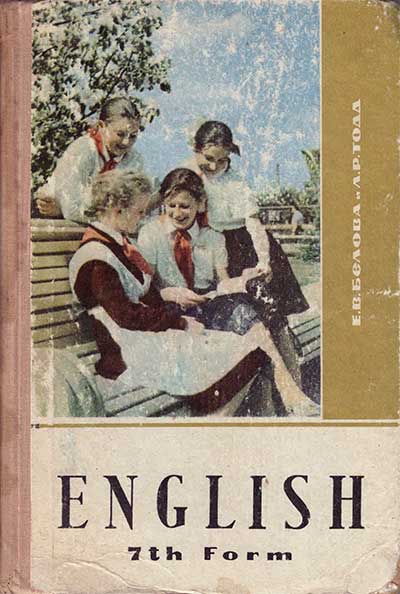
Елена Васильевна Белова
Луиза Робертовна Тодд
Учебник английского языка
для 7 класса
*** 1969 ***
От нас: 500 радиоспектаклей (и учебники)
на SD‑карте 64(128)GB — ГДЕ?..
Baшa помощь проекту:
занести копеечку — КУДА?..
|
Учебник оцифровал Василий Дёмин. _____________________ СОДЕРЖАНИЕ LESSON 1. How Do You Do? 3 The Best Time for Apples 4 Exercises 5 Homework 8 2. What Are They Doing? 10 «Why Are You Crying?» (A joke. Текст для чтения) 11 Exercises 12 Homework 13 3. We Like Sports and Games 14 The Last Football Match (Текст для чтения) 16 Exercises 17 Homework 20 4. Mike, His Brothers and Sister 21 Sisters, Brothers, Uncles, Aunts (Стихотворение) 22 Exercises 22 Homework 24 5. Mike and His Cousins (Текст для чтения) 25 List of New Words (Lessons 1—5) 26 6. A Letter to Our Pen-Friends in England 27 Exercises 30 Homework 31 7. At a Food Shop 32 Exercises 35 Homework 38 8. How Much Will That Be? (Текст для чтения) 38 9. New Clothes 40 Be Polite (Стихотворение) 42 Exercises 42 Homework 45 10. The Five Loaves of Bread (Текст для перевода) 46 11. Rama and His Master (Текст для чтения) 48 12. At the Telephone 49 “Who Is Speaking” (A joke. Текст для чтения) 51 Exercises 52 Homework 54 Revision Lesson I 55 List of New Words (Lessons 6—12) 59 13. At the Cinema (Текст для перевода) 61 14. At the School Library 64 Exercises 67 Homework 71 15. Two Jokes (Тексты для чтения) 72 16. Footmarks. Part One 72 Exercises 75 Homework 78 17. Footmarks. Part Two (Текст для чтения) 80 18. Great Britain and Ireland. Part One 81 Wind and Weather (Стихотворение) 84 Exercises 84 Homework 88 19. Great Britain and Ireland. Part Two (Текст для перевода) 88 20. At the Post-Office 91 A Different Language (Стихотворение) 93 Exercises 93 Homework 96 List of New Words (Lessons 13—20) 97 21. A Letter from Mike’s Mother to Alec’s Mother 98 A Nice Birthday Present (A joke. Текст для чтения) 101 Exercises 101 Homework 104 22. Too Early (Текст для чтения) 107 23. A Garden in the Far North (Текст для перевода) 109 One Hole or Two? (A joke. Текст для чтения) Exercises Homework 112 24. Eliza Runs Away with Her Son. Part One 112 Exercises 115 Homework 117 25. Eliza Runs Away with Her Son. Part Two (Текст для чтения) 117 26. Tom and Becky in the Cave. (Текст для чтения) 119 27. Tom and Becky in the Cave. (Текст для чтения) 121 28. Tom and Becky in the Cave. (Текст для чтения) 124 Revision Lesson II 127 List of New Words (Lessons 21—28) 129 Пояснения к урокам Урок 2. Present Continuous 130 Существительные с суффиксом -ег 131 Урок 3. Вопросительно-отрицательная форма глаголов 132 Урок 7. How Much и How Many 132 Местоимение they и существительное people 133 Урок 9. Present в значении Future 133 Сложные местоимения something, anything, nothing 134 Урок 13. Present Perfect 135 Урок 16. Сложные местоимения с some, any, по и every 137 Урок 18. Местоимение one (ones) 138 Урок 19. Степени сравнения многосложных прилагательных 138 Урок 20. Место наречий неопределённого времени в предложении 139 Урок 21. Суффикс наречия -1у 139 Таблицы 1. Таблицы по грамматике 140 1. Личные и притяжательные местоимения 140 2. Местоимения some, any, по 140 3. Множественное число существительных 141 4. Притяжательный падеж существительных 141 5. Окончание -(e)s в 3-м лице единственного числа Present Indefinite 142 6. Суффикс -(e)d в Past Indefinite 142 7. Спряжение глагола в Present Indefinite, Past Indefinite и Future Indefinite 142 8. Предложения с вводным словом there 143 9. Повелительное наклонение 143 10. Степени сравнения односложных и некоторых двусложных прилагательных 144 11. Числительные количественные и порядковые 144 12. Список глаголов, имеющих особые II и III формы 145 1. Чтение гласных букв в односложных словах 145 2. Чтение гласных букв в двусложных словах 146 3. Чтение диграфов 147 4. Сочетания гласных с группами согласных 148 5. Чтение букв 148 6. Чтение буквы s 148 7. Чтение букв w к у 149 8. Сочетания согласных букв 149 9. «Немые» буквы в сочетаниях согласных 149 Англо-русский словарь 150 Русско-английский словарь 165 Фрагменты: LESSON SIX
|











